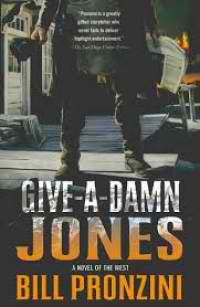Give-a-Damn Jones by Bill Pronzini
 Wednesday, May 23, 2018 at 9:17AM
Wednesday, May 23, 2018 at 9:17AM 
Published by Tor/Forge Books on May 8, 2018
As much as I love the lyrical descriptions of setting and the complex characterizations found in literary fiction, there is a special place in my heart for storytellers who confront memorable characters with compelling conflicts and resolve their plots without placing an unnecessary word on the page. Not many storytellers have that gift, but the prolific Bill Pronzini is one of them. While Pronzini primarily writes crime fiction, he’s authored a number of westerns, including his most recent, Give-a-Damn Jones.
Owen Hazard, who narrates the first and last chapters in Give-a-Damn Jones, meets Artemas Jones in Butte, where Hazard hopes to find temporary employment as a typesetter before resuming his roaming. Hazard is awestruck; Jones is something of a legend among itinerant typesetters.
When Jones moves on to Box Elder, the story moves with him. Various chapters are narrated by: a ramrod who works for a cantankerous rancher named Elijah Greathouse; the town’s newspaper owner and his son; the town marshal and his deputy; a farmer; a bartender; a saddle maker who is waiting to die at the hand of a newly released prisoner who vowed to kill him; the released prisoner, who is innocent of the crime for which he served time; a painless dentist who sells an elixir and has his own version of a traveling medicine show; and the dentist’s banjo-playing sidekick. And then there’s Greathouse’s daughter, who loves the released prisoner, despite Greathouse’s efforts to keep them apart. Greathouse — who wants to keep all the ranch land in eastern Montana for himself and is trying to drive off settlers and itinerant farmers who have every right to be there — is the novel’s primary villain, although the saddle maker is a close second.
With so many characters, the plot zigs and zags to interesting places before it settles on an ending. Part of the story addresses the conflict between Greathouse and the released prisoner while another involves the conflict between the released prisoner and the saddle maker. Greathouse schemes against the newspaper owner, whose animosity toward Greathouse is evident in frequent editorials. Still another subplot introduces a conflict between the painless dentist and a mean-spirit blacksmith who doesn’t think his tooth extraction was as painless as advertised. Jones stays in the background for much of the story, although he wanders into the plot at opportune moments.
Prozinski doesn’t use his carefully chosen words to describe the big Montana sky or how characters feel about their childhood, but he crafts easily visualized settings and gives each character a distinct personality. Most of his workmanlike prose is used to move the story along its winding path. I always enjoy Prozinski’s novels for exactly that reason: he puts the story first, without neglecting characterization or atmosphere.
Traditional westerns are known for confronting issues of justice and injustice in stark terms, for separating the white hats from the black hats, and Prozinksi furthers that tradition here. While Give-a-Damn Jones isn’t a story of moral ambiguity, and while Jones has the classic humility of a western loner hero, the novel has elements of realism (Greathouse’s daughter isn’t chaste; Jones carouses in bordellos and hates riding horses) that distinguish it from the Westerns of the 1950s. In the end, Give-a-Damn Jones gets my recommendation because Pronzini, as he always does, tells a good story.
RECOMMENDED
Reader Comments